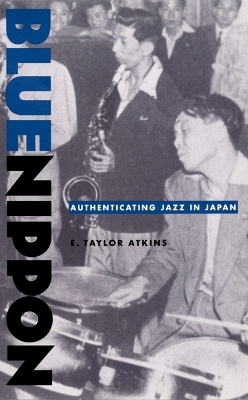
Blue Nippon
Authenticating Jazz in Japan
Seiten
2001
Duke University Press (Verlag)
978-0-8223-2721-9 (ISBN)
Duke University Press (Verlag)
978-0-8223-2721-9 (ISBN)
- Titel z.Zt. nicht lieferbar
- Versandkostenfrei
- Auch auf Rechnung
- Artikel merken
Japan's jazz community - both musicians and audience - has been begrudgingly recognised for its talent, knowledge, and level of appreciation. Underpinning this tentative admiration, however, has been a tacit agreement that, for cultural reasons, Japanese jazz 'can't swing'. This title explores the true and legitimate nature of Japanese jazz.
Japan’s jazz community—both musicians and audience—has been begrudgingly recognized in the United States for its talent, knowledge, and level of appreciation. Underpinning this tentative admiration, however, has been a tacit agreement that, for cultural reasons, Japanese jazz “can’t swing.” In Blue Nippon E. Taylor Atkins shows how, strangely, Japan’s own attitude toward jazz is founded on this same ambivalence about its authenticity.
Engagingly told through the voices of many musicians, Blue Nippon explores the true and legitimate nature of Japanese jazz. Atkins peers into 1920s dancehalls to examine the Japanese Jazz Age and reveal the origins of urban modernism with its new set of social mores, gender relations, and consumer practices. He shows how the interwar jazz period then became a troubling symbol of Japan’s intimacy with the West—but how, even during the Pacific war, the roots of jazz had taken hold too deeply for the “total jazz ban” that some nationalists desired. While the allied occupation was a setback in the search for an indigenous jazz sound, Japanese musicians again sought American validation. Atkins closes out his cultural history with an examination of the contemporary jazz scene that rose up out of Japan’s spectacular economic prominence in the 1960s and 1970s but then leveled off by the 1990s, as tensions over authenticity and identity persisted.
With its depiction of jazz as a transforming global phenomenon, Blue Nippon will make enjoyable reading not only for jazz fans worldwide but also for ethnomusicologists, and students of cultural studies, Asian studies, and modernism.
Japan’s jazz community—both musicians and audience—has been begrudgingly recognized in the United States for its talent, knowledge, and level of appreciation. Underpinning this tentative admiration, however, has been a tacit agreement that, for cultural reasons, Japanese jazz “can’t swing.” In Blue Nippon E. Taylor Atkins shows how, strangely, Japan’s own attitude toward jazz is founded on this same ambivalence about its authenticity.
Engagingly told through the voices of many musicians, Blue Nippon explores the true and legitimate nature of Japanese jazz. Atkins peers into 1920s dancehalls to examine the Japanese Jazz Age and reveal the origins of urban modernism with its new set of social mores, gender relations, and consumer practices. He shows how the interwar jazz period then became a troubling symbol of Japan’s intimacy with the West—but how, even during the Pacific war, the roots of jazz had taken hold too deeply for the “total jazz ban” that some nationalists desired. While the allied occupation was a setback in the search for an indigenous jazz sound, Japanese musicians again sought American validation. Atkins closes out his cultural history with an examination of the contemporary jazz scene that rose up out of Japan’s spectacular economic prominence in the 1960s and 1970s but then leveled off by the 1990s, as tensions over authenticity and identity persisted.
With its depiction of jazz as a transforming global phenomenon, Blue Nippon will make enjoyable reading not only for jazz fans worldwide but also for ethnomusicologists, and students of cultural studies, Asian studies, and modernism.
E. Taylor Atkins is Associate Professor of History at Northern Illinois University.
List of Illustrations
Acknowledgments
Prelude: Plenty Plenty Soul
1. The Japanese Jazz Artist and the Authenticity Complex
2. The Soundtrack of Modern Life: Japan’s Jazz Revolution
3. Talkin’ Jazz: Music, Modernism, and Interwar Japan’s Culture Wars
4. “Jazz for the Country’s Sake”: Toward a New Cultural Order in Wartime Japan
5. Bop, Funk, Junk, and That Old Democracy Boogie: The Jazz Tribes of Postwar Japan
6. Our Thing: Defining “Japanese Jazz”
Postlude: J-Jazz and the Fin de Siecle Blues
Notes
References
Discography
Index
| Zusatzinfo | 17 b&w photos |
|---|---|
| Verlagsort | North Carolina |
| Sprache | englisch |
| Maße | 152 x 235 mm |
| Gewicht | 558 g |
| Themenwelt | Kunst / Musik / Theater ► Musik ► Jazz / Blues |
| Geisteswissenschaften ► Geschichte ► Regional- / Ländergeschichte | |
| Sozialwissenschaften | |
| ISBN-10 | 0-8223-2721-X / 082232721X |
| ISBN-13 | 978-0-8223-2721-9 / 9780822327219 |
| Zustand | Neuware |
| Haben Sie eine Frage zum Produkt? |
Mehr entdecken
aus dem Bereich
aus dem Bereich
zur politischen Ästhetik des Jazz
Buch | Hardcover (2023)
Phillip Reclam (Verlag)
CHF 49,90
Die Geschichte des Jazz in Deutschland
Buch | Softcover (2021)
Reclam, Philipp (Verlag)
CHF 31,90


